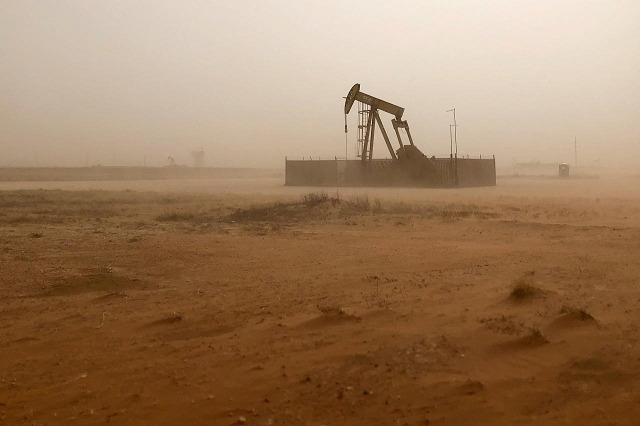Oil prices remain steady as market tightens on lost supply
The US government is trying to shut Iran out of oil markets when it fully implements its sanctions in November

A pump jack lifts oil out of a well, during a sandstorm in Midland, Texas, US. PHOTO: REUTERS
US light crude oil CLc1 was 20 cents lower at $73.25 per barrel by 0905 GMT. On Thursday, the contract hit its highest since November 2014 at $74.03 per barrel.
Oil price jumps to highest since 2014 after US quits Iran deal
Brent crude LCOc1 was up 40 cents at $78.25 a barrel.
Trade disputes between the United States on one side and major economies including China, India and the European Union on the other are beginning to cloud the outlook for global economic growth.
Investors worry that tariffs on exports, including US crude oil, will hamper the flow of goods and stall trading and eventually hit demand for oil.
Commodities brokerage Marex Spectron said this week that the macroeconomic outlook was “overwhelmingly bearish”.
Despite the trade dispute, oil supply is tight.
North American oil stocks have fallen as an outage at Canada’s Syncrude has locked in more than 300,000 barrels per day (bpd) of production. The outage is expected to last at least through July, according to operator Suncor Energy.
Outside North America, record demand and voluntary supply cuts led by the Organization of the Petroleum Exporting Countries (OPEC) have pushed up prices.
Iran oil exports to Europe, Asia at risk following Trump decision
Unplanned supply disruptions from Libya to Venezuela have further tightened the market.
OPEC and Russia have said they will raise output to meet demand and replace crude from unplanned disruptions but many analysts think the extra supply may be inadequate.
“The clear message from the OPEC+ meetings was that those countries with spare capacity would increase production to keep the market well-supplied,” US Jefferies bank said on Friday.
The US government is trying to shut Iran out of oil markets when it fully implements its sanctions in November.
“The Trump administration looks poised to carry on with a maximum pressure campaign on Tehran,” Phillip Futures said.
Major buyers of Iranian oil, including Japan, India and South Korea, have indicated that they may stop importing Iranian crude if US sanctions are imposed.
It is impossible to remove oil from market by November, says Iran
Until then, however, Asia is buying as much Iranian oil as possible. Imports of Iranian crude oil by major buyers in Asia rose in May to the highest in eight months.
China, India, Japan and South Korea last month imported 1.8 million bpd from Iran, up 15 percent from a year ago.



















COMMENTS
Comments are moderated and generally will be posted if they are on-topic and not abusive.
For more information, please see our Comments FAQ